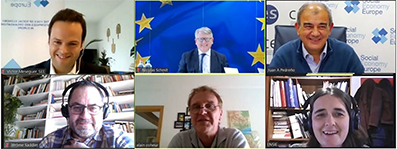On Monday 19 April 2021, Social Economy Europe (SEE) President Juan Antonio Pedreño, Vice-Presidents Jérôme Saddier, Patrizia Bussi and Alain Coheur, and SEE director Víctor Meseguer, met with Commissioner Nicholas Schmit (Jobs and Social Rights), to exchange about the European Action Plan for the Social Economy that will be released in the fourth trimester of 2021.
SEE President began his presentation by thanking Commissioner Schmit for the efforts to support social economy enterprises and organisations since he took office in late 2019: the announcement of the Social Economy Action Plan, his letter in April 2020 to all EU Ministers of Labour requesting them to make sure that social economy enterprises were able to access support measures on equal footing with other company forms; and other key measures and policies to which SEE is highly committed as the EU instrument for temporary Support to mitigate Unemployment Risks in an Emergency (SURE), the Pact for Skills and the European Pillar of Social Rights Action Plan, with its very much needed targets to create quality jobs for all, and foster the upskilling and reskilling through training opportunities.
Furthermore, SEE presented the main proposals contained in SEE’s policy paper Co-designing the Action Plan for the Social Economy: for an economy that works for people and the planet, including 7 areas for EU intervention and 51 concrete proposals.
Commissioner Nicolas Schmit thanked SEE for its “high-quality proposals” showing the wide and rich network of social economy stakeholders that it represents. Mr. Schmit stressed that in the current recovery context, in which the EU and the rest of the world are also facing the green, digital and demographic transitions: “the social economy is more needed than ever to ensure a just recovery and just transitions, making sure that no one is left behind”.
Reacting to SEE proposals, Commissioner Schmit agreed on the need of an ambitious and constant EU support to social economy enterprises, organisations and entrepreneurs as a key driver for Europe’s socio-economic development: “I agree that Québec’s Government model to promote social economy, that I know and that has proven its success, is highly interesting and inspiring for us”. Québec has a Social Economy Action Plan 2020-2025, renewed every 5 years, with a budget (of 137 million Canadian dollars for this period) and designed and implement in partnership with the main social economy stakeholders.
Regarding access to markets and a possible reform of article 54 of the Treaty of Functioning of the European Union, Commissioner Schmit stated: “Europe and the rest of the world have very much changed in the last decades, and I believe that there is room to adapt legislation to better capture the diversity of enterprises and companies operating in the EU, including social economy enterprise models”. He also added that the Conference on the Future of Europe is the ideal setting to discuss about the future of the treaties, and the potential of social economy enterprises and organisations.
Commissioner Schmit reacted also positively to the proposals to boost access to finance for the social economy, also through building a closer partnership with social economy financial players as cooperative and ethical banks and financiers, cooperative and mutual insurers, credit unions and the micro-finance community and mobilising EU funds as the InvestEU.
He also agreed on the need to set-up a common and inclusive understanding of the social economy in Europe, encompassing the different traditions and diversity of legal forms, and providing public authorities with guidance and support to develop public policies and legal frameworks on social economy; and on further exploring social economy’s engagement in the social dialogue. Mr. Schmit also highlighted the importance of the inclusion by Commissioner Thierry Breton of the social economy as one the fourteen industrial ecosystems for the recovery.
To conclude, Commissioner Nicolas Schmit emphasised his strong support to further promoting the social economy at global level through the external action of the EU and its international partnerships policy, in cooperation with Commissioner Jutta Urpilainen, with a key focus on promoting social economy through EU-Africa relations, and in the eastern and southern neighbourhood; and agreed with the importance of creating an EU single online platform to support social economy enterprises and organisations.
After the meeting, SEE President Juan Antonio Pedreño declared: “It has been a very positive meeting with Commissioner Nicolas Schmit, who very well knows the potential and the needs of the social economy to further grow across Europe as a people-centred enterprise model that generates economic and social progress and provides citizen-led innovative solutions to major challenges as climate change, local development, poverty and exclusion, and the demographic transition. We also welcome his willingness to develop the Social Economy Action Plan in partnership with SEE and social economy stakeholders in general. This is just the beginning of the path towards a European Social Economy Action Plan that has the potential to massively foster social economy entrepreneurship, social innovation and job creation by all social economy: cooperatives, mutuals, associations, foundations, social enterprises and other legal forms”.







